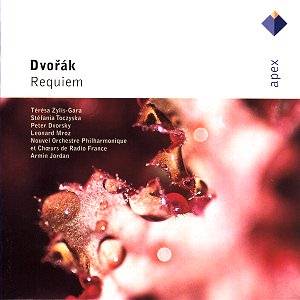It
is a shame that Dvořák’s sacred music has never approached
the popularity of his more famous symphonies, or his opera Rusalka
(he wrote many more operas, by the way: a trawl through the Supraphon
catalogue yields rich rewards in this area: go to www.ludwigvanweb.com).
His Stabat Mater does get an airing occasionally (and there
is a lovely recording by Sinopoli on DG 471 033-2), but it is
a pity that this infrequency is the case. In its time, his Requiem
(written in one year and premièred under the composer’s
baton as part of the Birmingham Festival of 1891) scored a success
and the work toured not only Bohemia and Moravia, but the United
States, Germany and Austria also.
István
Kertész’s account of the Requiem with the LSO on
Decca provides a useful reference point (now on Double Decca 448
089-2 or Decca Legends 468 487-2); Karel Ancerl also has much
to say on the matter (DG 468 487-2; Supraphon Ancerl Gold Edition
SU3673-2). Both make a better case than Jordan.
Armin
Jordan has never seemed the most exciting of conductors and in
the present case he provides a reading that, at the price, can
just about hold its own in the catalogue (it hails from the Erato
catalogue). Both Kertész and Ancerl reveal greater affinity
for Dvořák’s serenely lyrical outpourings (the ‘Dies irae’
sections are relatively harmless compared with Verdi, for example).
The Introitus (‘Requiem aeternam – Kyrie’) demonstrates
many of Jordan’s strengths: it is imbued with expectancy and the
soloists are nicely balanced (Peter Dvorsky is the well-rounded
tenor at ‘Te decet hymnus’). It is only in the Graduale
that doubts really start to creep in. The choir, which sounded
recessed in the Introitus, sounds more like a good amateur
choral society than a national radio chorus. There is a somewhat
blurred and indistinct impression that does not bode well and
which in fact forecasts future events. The ‘Confutatis maledictus,’
for example, is heavy and stodgy and the choir is almost swamped
by the orchestra.
The
best asset this set has is the group of soloists. Each has something
to offer. Térésa Zylis-Gara shines in ‘Quid sum
miser’ (the fifth movement); Stéfania Toczyska has a lovely
sound; Leonard Mroz’ huge bass commands attention in the ‘Lacrymosa’.
Jordan, to his credit, is sensitive to Dvořák’s careful harmonic
shifts and the orchestral soloists shine when required. There
is much beauty in this Requiem (the close of the work is
serenely touching), although at a running time of 1 hour 40 minutes,
it would take a performance of greater conviction than this one
to make for a truly uplifting experience.
Text
and translation would have been nice, too. Warner’s ‘Apex’ series
is lumpy in quality, and it has to be admitted that this is one
of its more middling offerings.
Colin
Clarke
